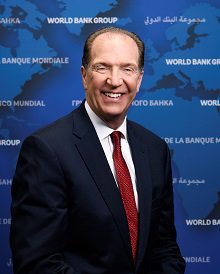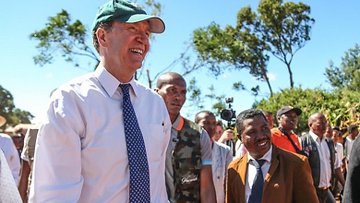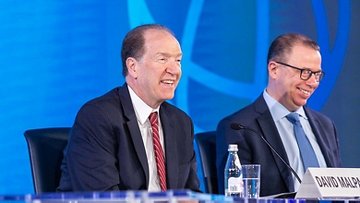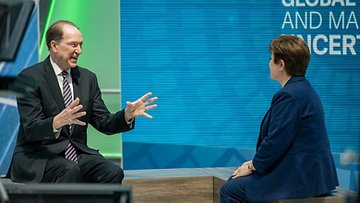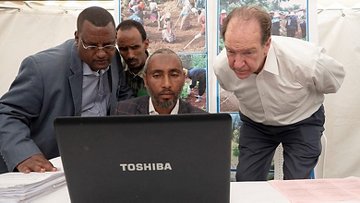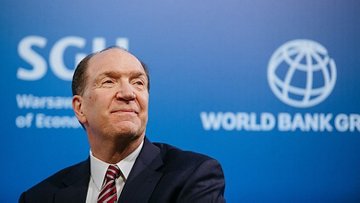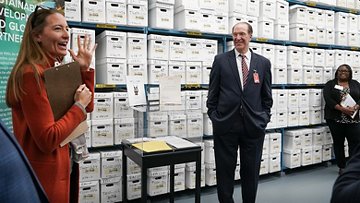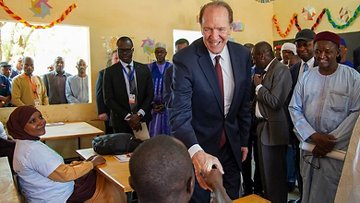13th President of the World Bank Group, April 9, 2019 - June 1, 2023
Malpass’s term as WBG President was marked most notably by the COVID-19 pandemic, which struck less than a year into his tenure. In addition to mounting the institution’s largest ever crisis response, the Bank Group under Malpass also increased support for fragile and conflict-afflicted states, began deploying IBRD and IFC capital increases, and sought tools to deal with increasingly problematic debt levels among its poorest members. Prior to his departure, Malpass launched the WBG’s Evolution Roadmap, intended as a review and enhancement of the institution’s operational and financial models.
Personal History
David Robert Malpass was born in Petoskey, Michigan on March 8, 1956. He graduated from Colorado College with a B.A. in physics and earned an MBA at the University of Denver. He became a Certified Public Accountant (CPA) and went on to study international economics at Georgetown University’s School of Foreign Service.
Malpass served in a variety of positions in both the private sector and the United States government prior to joining the WBG. He served in the administrations of both President Ronald Reagan, as Deputy Assistant Secretary of the Treasury, and President George H. W. Bush, as Deputy Assistant Secretary of State. During this period, he focused on an array of economic, budget, and foreign policy issues, including the United States’ involvement in multilateral institutions, the World Bank’s 1988 capital increase, and the Latin debt crisis. Malpass returned to the private sector in the 1990s, serving as Chief Economist for Bear Stearns and later founding Encima Global, a market research firm focused on global economic and policy issues.
In 2017, Malpass was confirmed as Under Secretary of the Treasury for International Affairs for the United States. His role included oversight of the U.S. government’s relationship with the WBG and representing the United States in international settings, including the World Bank–International Monetary Fund (IMF) Spring and Annual Meetings. In his testimonies to the U.S. Congress, Malpass advocated for the reforms embedded in the 2018 World Bank capital increase, advanced the Debt Transparency Initiative adopted by the WBG and the IMF, called for increased public disclosure of debt, and outlined steps to increase growth rates and median income worldwide.
The Setting: “A Crisis Facing Development”
At the close of the 21st century’s second decade, several economic, technological, and geopolitical events were impacting the development sphere. The digital economy was making its impact felt for rich and poor nations alike, transforming the way the private sector does business and governments support their citizens. China had become a key player in global development finance, primarily through its Belt and Road Initiative, as it increased capital flows to developing countries in need of additional capital. Interest rates rose after more than a decade of historically low rates following the global financial crisis of 2008-2009. Global poverty had, in the previous three decades, dropped noticeably, but the number of people living in extreme poverty in Sub-Saharan Africa continued to rise.
David Malpass joined a World Bank Group that was, if not unsettled, then in a moment of transition. Malpass’s predecessor, Jim Kim, had presided over a challenging and broadly unpopular Bank-wide reorganization in 2014 but had strengthened the institution’s financial footing through a successful capital increase. In February 2019, Kim abruptly announced that he would leave the WBG prior to completing his second term. The selection process for the new WBG president was undertaken in a climate of increasing skepticism by the U.S. administration and others towards multilateral institutions.
Initial Priorities
David Malpass took office as President of the World Bank Group on April 9th, 2019, in time for the start of that year’s WBG-IMF Spring Meetings. At the meetings, Malpass described the ongoing global economic slowdown and the impact it was having on developing nations, most notably in sub-Saharan Africa and fragile and conflict-affected countries. In a statement following the meetings, Malpass said, "It is critically important that we work tirelessly to foster broad-based growth, raise median incomes, create jobs, and fully incorporate women and young people in economies, to support a stronger, more stable global economy for everyone."
Citing the capital increase package agreed to the previous year and the potential for a large upcoming IDA19 replenishment, Malpass emphasized how the top priority for the institution was creating strong outcomes for people in developing countries. He also touched on topics that would be a focus throughout his presidency and expressed support for Bank Group initiatives on: debt transparency, education, gender and inclusion, climate adaptation, and the importance of strong country programs.
The 2018 capital increase, agreed to at the previous year’s Spring Meetings, was accompanied by several policy commitments, and much of the Bank Group’s attention in 2019 was devoted to initiating or fulfilling these obligations. These measures, which were closely associated with commitments made as part of the Bank Group’s 2016 Forward Look, included:
- Deploying scaled-up assistance to countries and sectors that most needed financing;
- Supporting drivers of long-term sustainable growth – including investments in human capital and resilience; and
- Further strengthening the WBG’s operational model and effectiveness.
The final months of 2019 included the fine-tuning of plans for an organizational realignment of the Bank’s operational structure. The realignment, which was announced to staff on January 9, 2020 and implemented in the months following, sought to strengthen the Bank Group’s engagement with client countries. It established operational reporting lines similar to the pre-2014 structure, with country directors and practice managers again reporting to regional vice presidents.
COVID-19
On July 16, 2019 in Paris, France, WBG President Malpass made a speech commemorating the 75th anniversary of the Bretton Woods Conference, which gave birth to both the World Bank and the IMF. During his address, Malpass noted how the delegates of 44 countries convened while battles still raged across Europe and the Pacific and how the World Bank’s first loans were for post-war reconstruction. In the Bank’s 75th year the institution would be called on to respond to a global crisis of a different type.
On January 7, 2020, public health officials in China identified a novel coronavirus as the causative agent of a pneumonia outbreak of previously unknown etiology; soon after, the World Health Organization (WHO) referred to the virus as the “2019 Novel Coronavirus”. Within two months, the WHO declared COVID-19 a pandemic as more than 118,000 cases of the virus had been identified in 114 countries around the world.
Widespread distribution of a potential COVID-19 vaccine to poorer countries was a key focus of the WBG. In anticipation of the first vaccine available for emergency use authorization, in October 2020, the WBG approved financing of up to $12 billion to help low-income and middle-income countries purchase and distribute vaccines. IFC also invested in the manufacture of vaccines and related supplies through its $4 billion Global Health Platform. In the year following the release of the first vaccine available to the public, the WBG funded 100 million doses available in over 60 countries.
While initial focus of the COVID-19 response was on the ability of the poorest countries to react to the severe health and humanitarian impacts of the pandemic, the deteriorating economic situation in these countries was just as urgent. The pandemic had, in a short period of time, devastated the global economy, and the heaviest burden of the pandemic had fallen on the most vulnerable people and communities with the fewest safety nets. “It’s clear that we face a unique pandemic of inequality,” Malpass said during his address at the 2020 Annual Meetings, “the downturn is broader and deeper, and it has hit informal sector workers and the poor – especially women and children – the hardest.” After years of positive development outcomes, the WBG estimated that the pandemic had pushed nearly 100 million people into extreme poverty.
WBG staff were forced to confront this emerging reality in a vastly different working environment. In March 2020, while working to advance financial commitments unlike any the WBG had made before, staff quickly transitioned to home-based work. The technical challenges and organizational logistics necessary to facilitate this move were also unique in the WBG’s history. Travel, events, and Spring and Annual Meetings were curtailed or cancelled outright, and an Emergency Management Team was activated to ensure staff could continue working from home while mobilizing information and resources with staff safety and wellness as the priority. As he reported to staff in a September 2020 weekly update, President Malpass recognized personal challenges, too: “Like many of you,” he wrote, “I’m working from my dining room table and encroaching on my family’s space.” Most staff would only begin returning to the office in a hybrid context in the summer of 2022.
FCV, Environmental, and Other Crises
- A locust outbreak in East Africa beginning in 2019; WBG mobilized emergency financing, complemented by policy advice and technical assistance.
- A massive explosion in the Port of Beirut in August 2020; the explosion occurred in close proximity to World Bank Group-IMF offices and a number of staff members suffered injuries. WBG offered support to reform and rebuild Lebanon’s port sector.
- Ongoing drought in the Horn of Africa, beginning in 2020; WBG launched a number of initiatives targeted at food insecurity and climate resilience in the region.
- Withdrawal of United States troops from Afghanistan in August 2021; donors to the Afghanistan Resilience Trust Fund, which is administered by the World Bank, approved its “expanded approach” for Afghanistan which included the provision of more than $1 billion in grants to select United Nations agencies and international NGOs.
- Earthquake in Haiti in August 2021; a donors’ conference was convened, mobilizing $600 million, of which nearly $200 million was committed by the WBG.
- Flooding in Pakistan in 2022; WBG approved $1.692 billion in financing for five projects to support people living in flood-affected areas. Projects supported housing, agriculture, and health sectors.
The WBG also responded to instances of fragility, conflict, and violence (FCV) in Afghanistan, Ethiopia, Somalia, Yemen, and elsewhere. As part of its February 2020 release of the World Bank Group Strategy for Fragility, Conflict, and Violence 2020-2025, the WBG noted that there were, at that point, more violent conflicts globally than at any time in the past 30 years.
The conflict with perhaps the most severe consequences for regional and international stability took place in Eastern Europe when, in February 2022, the Russia Federation invaded Ukraine. The WBG responded quickly to the needs of Ukrainians, mobilizing an initial $723 million package for support of the country’s critical services within days of the invasion and setting up a fast-disbursing multi-donor trust fund (MDTF) to facilitate the channeling of grant resources from donors to Ukraine. The Bank Group increased its support over the course of the invasion; by March 2023, through International Bank for Reconstruction and Development (IBRD) loans, donor grants, bilateral shareholder guarantees, and utilization of the International Development Association’s (IDA) capital cushion, more than $20 billion in support of Ukraine had been mobilized.
The effects of the Ukraine invasion also exacerbated preexisting global food shortages. As a result of supply chain disruptions from the COVID-19 pandemic, rising inflation, and high commodity prices combined with the war in Ukraine, acute food insecurity rose to its highest levels in 15 years in 2023. The WBG responded to the escalating crisis in four areas: supporting production and producers; facilitating increased trade in food and production inputs; supporting vulnerable households; and investing in sustainable food security. The institution made over $26 billion available for short- and long-term food security interventions in 69 countries, with $8.1 billion made available in the year immediately following the invasion of Ukraine. Further, in December 2022, the WBG and the G7 established the Global Alliance for Food Security as an immediate and concerted response to the food and fertilizer crisis. As part of the alliance, Germany and the WBG launched the Global Food and Nutrition Security Dashboard to track up-to-date data on food crisis severity and to improve coordination.
The Russian invasion of Ukraine had immediate implications for WBG staff and operations in the countries. By February 12, 2022, the relocation of staff from Ukraine was already underway, even as financial support for the country was about to ramp up. On March 2, the WBG announced that it had stopped all programs in Russia and Belarus with immediate effect.
Growth, Debt and Debt Transparency
These multiple crises coincided with huge setbacks for current and prospective global growth, with major damage to lower income people worldwide. President Malpass engaged fully in the Bank’s economic analyses and presentations in the semiannual Global Economic Prospects and interaction with global leaders on countering the setbacks. He advocated growth-oriented structural reforms and currency stabilizations to increase investment and job growth.
However, while the COVID-19 pandemic severely worsened the debt situation for the world’s poorest countries, the issue had been deteriorating in the years prior to the pandemic. One of Malpass’s priorities upon joining the World Bank Group was to promote debt transparency and sustainability; indeed, he took an active role in addressing the topic even prior to joining the WBG as Under Secretary of the Treasury for International Affairs for the United States.
The global recession brought on by the COVID-19 pandemic created an even greater stress on developing nations’ ability to manage their debt burdens. In response, leading into the 2020 Spring Meetings, President Malpass, joined by IMF Managing Director Kristalina Georgieva, proposed a suspension of debt payments for IDA countries and invited the G20 to task the IMF and World Bank to propose comprehensive action on debt relief. The G20 and Paris Club adopted a Debt Service Suspension Initiative (DSSI), as it was called, which took effect on May 1, 2020. The DSSI initially suspended debt service payments from May through December 2020, and was extended through December 2021; 48 out of 73 eligible IDA countries participated and $12.9 billion in debt-service payments owed by these countries were suspended. Malpass, the IMF, and the G20 also called on private creditors to participate in the initiative, but these efforts were largely frustrated. In addition, under Malpass’s leadership, the WBG worked jointly with the IMF to implement and improve the G20’s DSSI and Common Framework for Debt Treatment and launched the Global Sovereign Debt Roundtable in 2023 to work toward a more effective process for debt transparency, restructuring and sustainability.
Climate Change
Climate change and its impacts on developing countries continued to be at the forefront of World Bank Group operations through President Malpass’s tenure. The Bank Group under Malpass increased its support for developing countries’ mitigation of greenhouse gas emissions and resilience to climate impacts, cementing its place as the largest multilateral provider of climate finance for developing countries. From FY19 to FY22, the institution more than doubled its annual investment in climate-related projects, from $14.2 billion to nearly $32 billion.
But despite this progress, many country members and external critics did not think the institution, or Malpass, specifically, was doing enough. These criticisms peaked following Malpass’s appearance at a September 2022 climate change event, where, in response to a question about whether he accepted the scientific consensus that manmade burning of fossil fuels is warming the planet, he responded, in part, that “I am not a scientist.” In the days following the event, Malpass defended the Bank’s accomplishments in the climate sector, saying, “Successful climate action to reduce greenhouse gas emissions will take a concerted global push, and we are committed to this effort. Climate is a defining challenge facing development.”
Evolution Roadmap
Despite the institution’s accomplishments, a common and increasingly vocal refrain by both WBG member countries and the institution’s critics was that the Bank Group could be doing more to increase financing for global public goods, especially climate action. At the 2022 WBG-IMF Annual Meetings, these calls to greater action culminated in a specific request for the WBG to develop ways to significantly increase its lending and mobilize more private capital to address climate change and other global needs. At the meetings, US Treasury Secretary Janet Yellen requested that the WBG develop an “evolution roadmap” that would explore ways the institution could dramatically expand its lending capacity.
In the months following the release of the Roadmap, an online consultation platform was launched to provide stakeholders with an opportunity to participate in the evolution process. The 2023 WBG-IMF Spring Meetings served as the backdrop for Bank leadership and member countries to further the discussion and build momentum towards significant change. Around this time, a series of measures designed to increase the Bank’s lending capacity was implemented: the revision of the IBRD’s equity to loan ratio from 20% to 19%; a recommendation from the Executive Directors to Governors to remove statutory lending limits; and the expansion of the size of the bilateral shareholder guarantee program by $5 billion. While these moves were expected to expand lending capacity by up to $50 billion over the next ten years, work on the Roadmap initiative would continue, as the needs of developing countries far outpaced this initial increase.
Departure
Having led the Bank Group through multiple crises and a record response, on February 15, 2023, Malpass informed the Bank Group’s Board of Directors of his intention to step down as President by the end of the fiscal year. Malpass officially left the Bank on June 1, 2023, ten months before the expiration of his five-year term.
